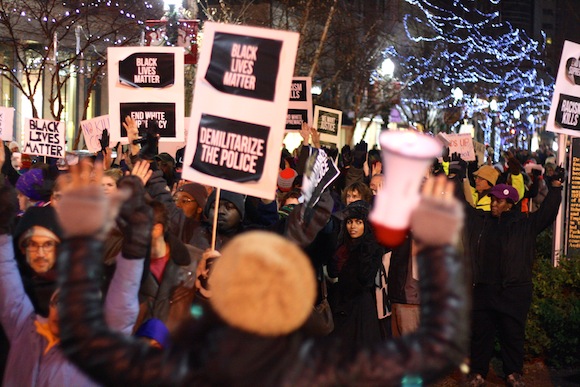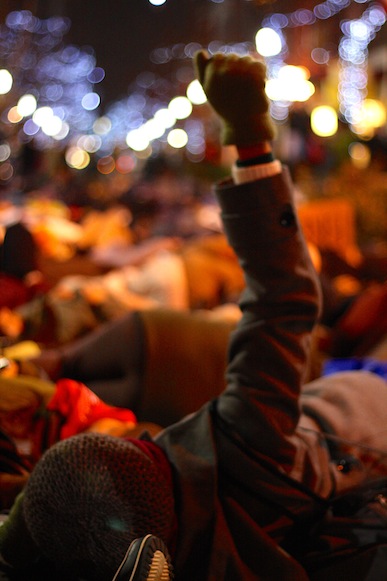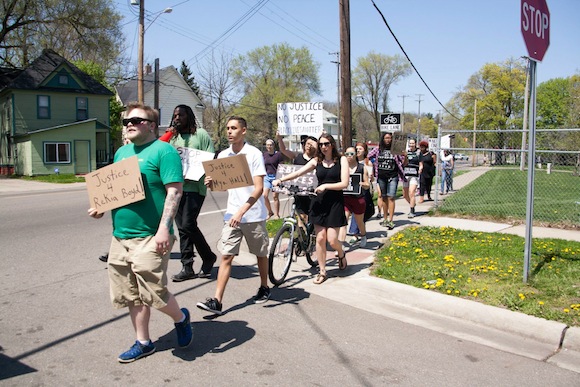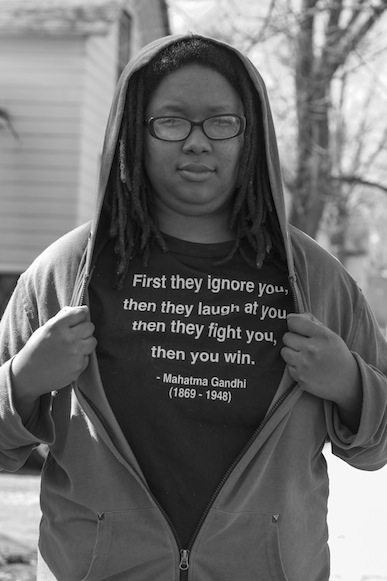Kalamazoo 4 Justice: Envisioning a community where the promise of equality is guaranteed
Kalamazoo 4 Justice acts in solidarity with the national Black Lives Matter movement. Here's what they're working toward.
Twenty-eight: the number of hours that elapse before another black woman, man, or child is killed by law enforcement. Twenty-five: the estimated percentage of black women living in poverty. Thirty-five: the life expectancy of a black, trans woman. These are the statistics listed on the website of blacklivesmatter, the movement born in 2012 following the acquittal of George Zimmerman, the man who shot and killed Trayvon Martin in Sanford, Florida.
Black Lives Matter, which is being called the modern civil rights movement, is responsible for shoving into the public spotlight the hundreds year old issues of racial inequality, injustice, and violence. The movement’s primary focus is on the national crisis of police violence toward and killing of black and brown people.
Following Michael Brown’s shooting death by a police officer in Ferguson, Mo., just one year ago, a local group, Kalamazoo 4 Justice (K4J), formed in direct response to and in order to act in solidarity with the national Black Lives Matter movement, and to address specific discriminatory and violent behavior by local law enforcement. And based on a study initiated by KDPS in 2011 to analyze racial profiling within their department, K4J’s concerns are justified.
The study, conducted between March 1, 2012 and February 28, 2013 found that KDPS officers stopped more African American motorists than would be expected on the basis of the benchmarks at all 11 of the benchmark locations that recorded enough stops for analysis. In fact, out of the 11 locations, all of them were found to stop people of color by at least one-and-a-half times more often than white people. In five of the locations that odds ratio was greater than two times more likely, and in one location, it was nearly three times more likely.
In an open letter to the community on Feb. 16, 2015, Chief Jeffrey Hadley laid out the police force’s plans to combat discriminatory profiling behavior within the police force. Contained in the letter are six areas for improvement: Building Trust and Legitimacy, Policy and Oversight, Technology and Social Media, Community Policing and Crime Reduction, Training and Education, and Officer Safety and Wellness. In each area, Chief Hadley detailed specific strategies for combating his force’s evidenced profiling of people of color.
But K4J is not satisfied with the proposed modifications. They find references to two police departments (Milwaukee and Chicago) that have discriminatory and violent reputations as models for facilitating change within KDPS concerning. K4J issued a detailed response letter, in which they contest Hadley’s six points and insist that until the origins of white supremacy within policing are addressed no meaningful change can take place.
Jacquis Robertson is a core member of K4J. She says, “The problem is the militarization of police, the lack of accountability that police have to the communities they serve, and the silencing of black voices through the use of government policy.” She says that while the Police Chief’s efforts seem to be a step in the right direction, it’s merely giving the community a false sense of progress because the department is not addressing the root issues.
In response to challenges that his department is not addressing the historical implications of institutional racism, Chief Hadley says, “we have acknowledged that there is disparate impact that has happened in policing over a long period of time.” He says they’ve put a plan in place to try and address this in a responsible way. Part of that includes training on implicit bias, which he says his whole department is trained in. Within that curriculum is the historical element, though he contends, “it may not go as in-depth or be as exhaustive as some may think (it should), but I think it’s a start.”
Hadley goes on to note, “Criticism comes with many of the things that we do. I certainly understand and appreciate that, and respect people’s positions and feelings on these very sensitive and emotional matters. I think we have done a significant amount of work over the last several years and still have a lot more work to do.” He says he’s never turned down a meeting, and welcomes meetings with community members and activists, “so (they) can talk about issues and find some common ground.” He says his department has reached out to K4J in the past prior to demonstrations to ask “How can we help? How can we make it successful and safe for you and legal?” and he thinks that’s worked pretty well.
While the Police Chief says he feels that the police department’s transparency about study results and associated efforts have left the department in good standing with the majority of the community, K4J says that there is too much historical distrust between black residents and the police force for trust to be so quickly reinstated. One thing both unequivocally agree on is the reality that meaningful institutional change and community healing is not something that will happen overnight.
K4J’s mission seeks to change the social and political landscape through community engagement, public dialogue, and direct action regarding all forms of oppression, exploitation, and injustice, as they intersect with racism, both locally and nationally. K4J envisions a community where the promise of equality is guaranteed for everyone. Their demands, which they laid out at City Hall on Martin Luther King, Jr. Day this year, include:
An end to all forms of discrimination and the full recognition of human rights.
• Freedom from mass incarceration and an end to the prison industrial complex.
• An immediate end to police brutality and the murder of black, brown, and all oppressed people, and the demilitarization of police.
• Decent, affordable housing for the shelter of human beings, and an end to discriminatory housing practices.
• Opportunities of equitable employment options and support for businesses owned by people of color.
• An end to the school to prison pipeline, and an insistence on quality education for all that ensures the Kalamazoo Promise fulfills its promise to ALL of our children.
While Kalamazoo has recently seen an emergence of prominent black leadership within the community, Robertson says that it is no sign or indicator of healed racism.
“Race is a construct that intersects with many systems, the best example being class,” Robertson says. “If you’re not talking about race as it pertains to class or as it pertains to sex or other systems you are simply talking about nothing. The emergence of a black leader does not change the relation of power. It simply makes the masses believe it does.”
And on the retort of “All Lives Matter” to Black Live Matter, she says, “When proclaiming “Black Lives Matter,” (I say this as a woman of color) we are stating that even though we were slaves and considered simply property, we matter. Even though we were the strange fruit produced by hate, we matter. Even though a large amount of us fill penitentiaries, we matter. And even though our existence has been and will continuously be a threat to white supremacy, we matter, and ‘all lives matter’ is an attempt to silence that. Its context is non-existent. Its conception was out of fear and not out of understanding. It doesn’t warrant a response.”
Kalamazoo 4 Justice works primarily in collaboration with other local organizations committed to anti-racist and anti-oppressive agendas, including Michigan United, Arcus Center for Social Justice Leadership, and the Peace House. Their most notable actions have been the Die-In at Art Hop back in December 2014, the Not One More march on New Year’s Eve, and the Martin Luther King Jr. Three Day Action. Two of their founding members, Cody Dekker and Shannon Sykes, are running for Kalamazoo City Commission.
K4J is primarily social media dependent. The best way to stay up to date on upcoming meetings and actions is to follow them on Facebook and Twitter. People of Color and allies are all welcome to be involved.
Kathi Valeii is a writer, speaker, and activist living in Kalamazoo. She writes about gender-based oppression and full spectrum reproductive rights at her blog, birthanarchy.com.
Photos courtesy Kaitlin Martin



















